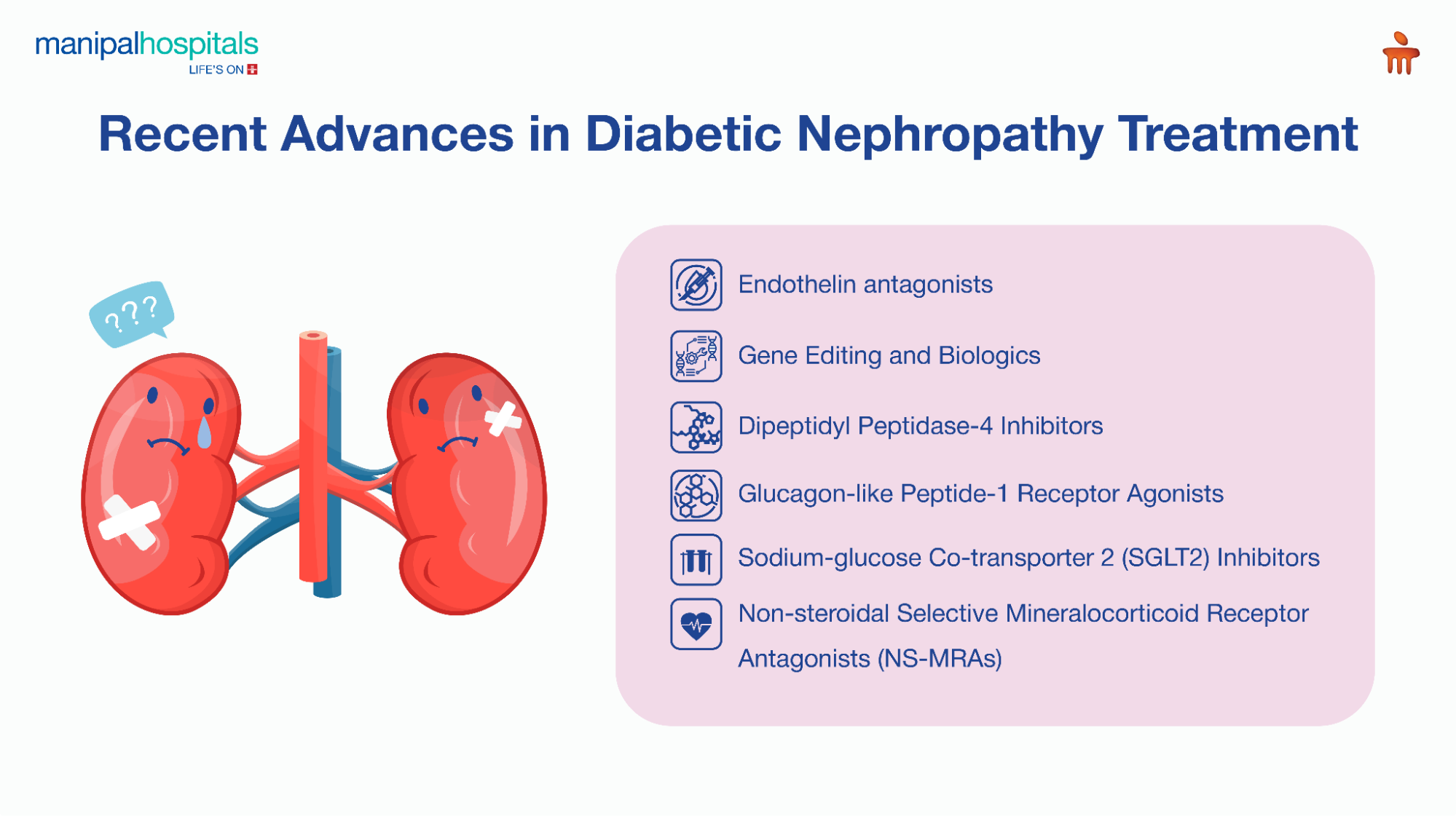
Diabetic nephropathy is the predominant cause of chronic kidney disease and kidney failure in India. It is estimated that 30.3% of diabetic patients suffer from this condition1. Despite treatment, many patients progress to end-stage renal disease requiring Dialysis and Kidney Transplantation. This blog post will focus on and discuss diabetic nephropathy treatment and recent advances in diabetic nephropathy treatment.
Synopsis
- What Is Diabetic Nephropathy?
- Conventional Therapies for Diabetic Nephropathy
- Recent Advances in Diabetic Nephropathy Treatment
- Lifestyle & Diabetes Management: The Forgotten Pillars of Kidney Health
- The Surgical Angle: Metabolic Surgery for Diabetes Management
- Future Therapies in the Pipeline
- Conclusion
What Is Diabetic Nephropathy?
Diabetic nephropathy is a long-term complication of diabetes mellitus, characterised by damage to the kidney and its blood vessels. This damage results in hypertension, proteinuria, and eventually renal failure. Diabetic nephropathy impairs kidney function and significantly increases the risk of cardiovascular events and premature death.
In the early stages, diabetic nephropathy is asymptomatic. As it advances, signs may include:
-
Swelling in the feet, ankles, or around the eyes
-
Foamy urine (due to proteinuria)
-
Increased blood pressure
-
Fatigue, poor appetite, or weight loss
-
Nausea and vomiting
Regular screening can detect kidney damage even before symptoms appear.
Risk factor modification, such as blood glucose control, hypertension and hyperlipidaemia management, and the use of renin-angiotensin-aldosterone-system blockade have proven to help delay the progression of diabetic nephropathy. In recent years, newer therapeutics have provided additional treatment options for patients. Several recent studies indicate that a multidisciplinary approach could inhibit diabetes kidney disease progression and reduce cardiovascular events.
Conventional Therapies for Diabetic Nephropathy
-
Renin-Angiotensin-Aldosterone System (RAAS) Blockade: Angiotensin-Converting Enzyme (ACE) inhibitors and Angiotensin Receptor Blockers (ARBs) remain the cornerstone in diabetic kidney disease (DKD) treatment. They help delay the onset and progression of diabetic nephropathy by controlling blood pressure and reducing proteinuria.
-
Glycaemic Control: Optimal blood sugar levels using insulin or oral hypoglycaemics is crucial to reduce glomerular stress.
-
Statins: By improving lipid profiles, statins indirectly support kidney health and have cardioprotective effects.
However, despite the above conventional therapies for controlling blood pressure, sugar levels, and lipids cannot be sustained or effective in reducing the incidence of diabetic nephropathy, calling for newer and more targeted treatments.
Recent Advances in Diabetic Nephropathy Treatment
The past decade has ushered in a revolution in DKD management. Let’s explore some cutting-edge therapies:

-
SGLT2 Inhibitors (e.g., Dapagliflozin, Empagliflozin): Originally developed as glucose-lowering agents, they now offer remarkable kidney protection, independent of glycaemic control.[a]
-
GLP-1 Receptor Agonists (e.g., Semaglutide, Dulaglutide): Shown to improve cardiovascular and renal outcomes, these agents may also aid weight loss.
-
Non-Steroidal Mineralocorticoid Receptor Antagonists NS-MRAs (e.g., Finerenone): A landmark advancement, Finerenone reduces albuminuria and slows CKD progression, particularly when used alongside RAAS blockade.
-
Endothelin Receptor Antagonists (e.g., Atrasentan): By targeting endothelin-1 pathways, these agents protect glomerular structure and reduce proteinuria.
-
DPP-4 Inhibitors: Although less potent than SGLT2 or GLP-1 agents, they still contribute to metabolic and possibly renal stability.
-
Gene Therapy & Biologics: CRISPR-based interventions, lipid-lowering biologics, and targeted anti-inflammatory molecules are in early trials but hold transformative potential.
Combining Therapies: A Multidisciplinary Approach
When SGLT2 inhibitors, NS-MRAs Finerenone, and RAAS blockers are combined, and glycaemic and BP control is optimized, renal decline slows significantly.
Lifestyle & Diabetes Management: The Forgotten Pillars of Kidney Health
Medication alone isn’t enough. Protecting your kidneys also means:
-
Blood sugar monitoring
-
Controlling blood pressure and cholesterol
-
Sodium and protein moderation in diet
-
Weight loss, regular exercise
-
Smoking cessation
The Surgical Angle: Metabolic Surgery for Diabetes Management
For selected obese diabetic patients, Roux-en-Y Gastric Bypass has shown benefits in reducing albuminuria and slowing CKD. However, its role in kidney protection remains under evaluation and must be individualised.
Future Therapies in the Pipeline
NF-E2-related Factor 2 Activator (Nrf2) (e.g., Bardoxolone methyl): In mouse models, Nrf2 has shown the potential to improve filtration rate in patients with diabetic nephropathy. It also enhances antioxidant responses in kidney tissue.
-
Protein Kinase C (PKC) Inhibitors – Target inflammatory pathways in glomeruli.
-
Microbiome Modulators & Anti-inflammatories – Aim to treat the gut-kidney axis.
Conclusion
Diabetic nephropathy is a serious complication of diabetes mellitus that can lead to chronic kidney disease or end-stage renal disease. Therefore, it becomes important to devise a treatment plan that prevents the progression of the kidney disease and improves the patient’s quality of life. No single class of drug can produce a significant therapeutic effect; therefore, combined therapy with novel drugs is expected to improve clinical outcomes for diabetic nephropathy in the future.
Contact Manipal Hospitals, Goa, for evidence-based and innovative diabetic nephropathy treatment and management by an expert nephrologist.
FAQ's
Kidney damage caused by diabetes is termed diabetes nephropathy. The condition develops slowly over many years and can damage the small blood vessels and tiny filters in your kidneys. When this happens, abnormal amounts of protein in your blood can leave your body through urine.
In the early stages, patients may not experience symptoms. As the kidney function declines, you may develop swelling in the body, often in the feet and legs. Other symptoms include poor appetite, weight loss, or weakness.
Diabetic nephropathy is diagnosed and monitored with yearly tests that check your kidney function. These include an albumin urine test and an analysis of the estimated glomerular filtration rate.
Yes, diabetic nephropathy is a serious kidney disease that may lead to kidney failure. If left untreated, kidney failure may eventually lead to death.
You can schedule an appointment at Manipal Hospitals, Goa, by contacting us or visiting our website.
Visit: https://www.manipalhospitals.com/goa
Contact no: 1800 102 5555





















 5 Min Read
5 Min Read




.png)












